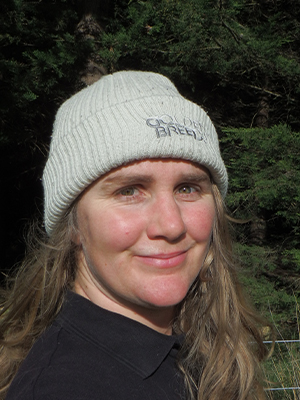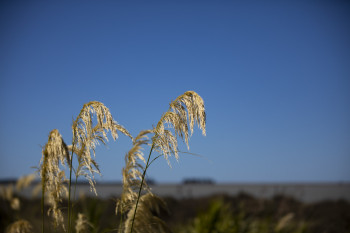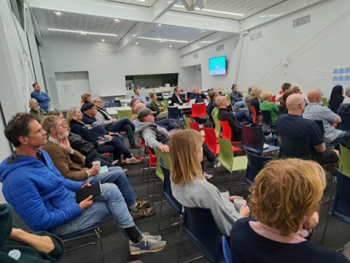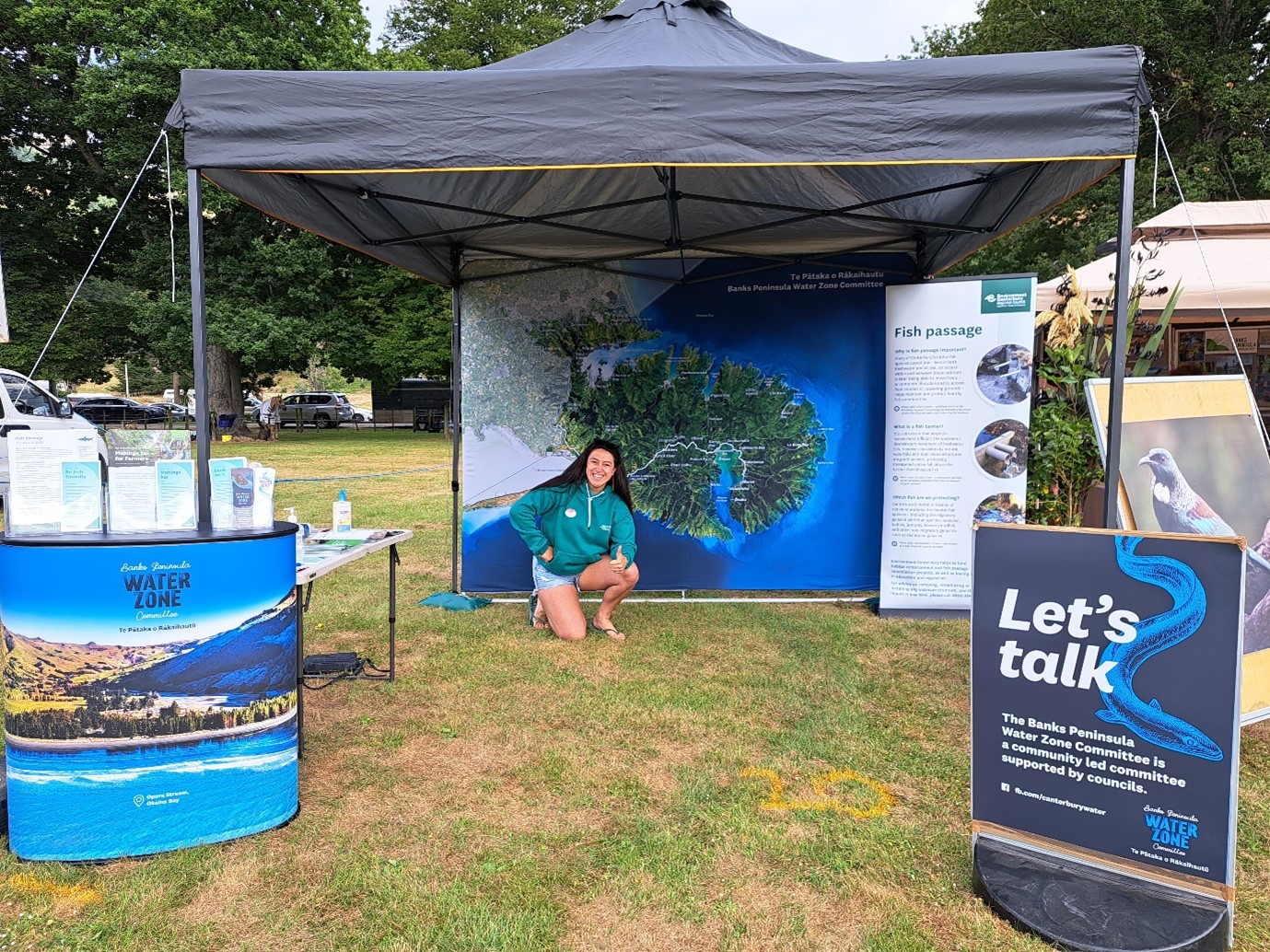Banks Peninsula Water Zone Committee progress report
Each of Waitaha/Canterbury’s water zone committees has an action plan which outlines how they will work with the community to deliver their aspirations for freshwater, as outlined in the Canterbury Water Management Strategy (CWMS). Committees report annually to let the CWMS partners and the community know how things are tracking.
2022/23 Progress report
From the chair: Enhancing and protecting our precious peninsula

Gina Waibl, Banks Peninsula Water Zone Committee Chair
Reflecting on the year, I am inspired by the work being done to improve biodiversity and the health of our waterways on Banks Peninsula. As a committee, we are pleased to be able to work with and support the many landowners and grass-roots community organisations working on the peninsula.
We have been strengthening our voice by working more closely with the Christchurch West Melton water zone committee and the Whaka-Ora Healthy Harbour Programme. This led to us hosting a joint public workshop in April focusing on sediment and erosion control and how Councils, landowners, researchers and community groups can all work more effectively together in this area, as sediment and erosion are a key concern, particularly on the Port Hills and in Whakaraupo where highly erodible loess soils have the potential to smother sensitive waterways.
One outcome of the April workshop is that we are collectively advocating for an integrated Port Hills Management Plan with a clear vision for what we want the Port Hills to be in the future, to truly realise the Port Hills as a jewel in the crown for Christchurch.
There is still much to be done, but together we can work towards a Banks Peninsula with clean water and thriving biodiversity.
Gina Waibl.
Key achievements for 2022/23
- Recommended allocation of our Action Plan budget
- Had a display at the 2023 Little River show, focusing on mahinga kai, fish passage, and climate change
- Had a Stormwater Superhero display at the de-plastics event in Lyttelton, using the Stormwater Superhero trailer
- Results for the first one of four trial sites for the Christchurch City Council (CCC) Cut Slope Soil Erosion Control shared at the April workshop on erosion and sediment control
- Created new Banks Peninsula stream care information sheets, by CCC communications staff: Be Fish Friendly (fish passage), Mahinga Kai, Bank on it (stream banks), Go with the Flow (flooding). CCC has placed these in service centres and libraries
- Updated Action Plan
- Early Annual Plan input provided to councils
- Engagement with, and support provided to, a range of community groups doing amazing mahi
- Erosion and sediment control workshop jointly held with the Christchurch West Melton Zone Committee and Whaka Ora Healthy Harbour in April 2023
- Took part in a Northern CWMS Zone Committee hui about reviewing and updating the Regional Policy Statement, Regional Plan, and Coastal Plan.
Local projects helping to deliver on the CWMS targets
Read some of the stories about what is being done in the zone to deliver on the CWMS targets.
Working with key partners
Improved communication - monitoring of water quality for contact recreation around Whakaraupō and Banks Peninsula
The water quality at Whakaraupō/Lyttelton Harbour is a key focus for the committee.
Following the public interest in water quality for contact recreation in Whakaraupō and Akaroa Harbour over the 2022-2023 summer, the Committee hosted presentations in March on the monitoring of water quality for contact recreation.
In May, the Committee held a workshop to identify and share their ideas about how to improve communication and signage. The Committee invited community members who have demonstrated a high level of interest in the topic, along with representatives from key agencies.
The ideas generated have since been shared with key staff at Environment Canterbury, Christchurch City Council, Te Whatu Ora, and Te Mana Ora for them to consider.
In June, the Committee was briefed on the key findings of faecal source tracking analysis. Community members and agency representatives participated also. The Committee made a number of recommendations. These were focused on: investigating and quantifying the sources of pollution to stormwater in Corsair Bay; identifying the sources of the faecal contamination and finding solutions; auditing existing signage and creating new signage that effectively communicates the risk after rain; requesting changes to the LAWA website; and removing some testing sites so that sampling can be increased at more popular recreation sites.
The Committee also committed to several actions: hold another workshop; identify how to add value to community engagement and help with finding solutions; a stormwater superhero engagement campaign; and working with Whaka Ora Healthy Harbour to engage the rural sector to find solutions to ruminant and avian sources.
This work helps meet these CWMS targets: Recreational and amenity opportunities
Action Plan budget project

Banks Peninsula is home to many different species of plants and animals.
The Committee supported the following projects by recommending the allocation of the $50K available for the 2022-2023 CWMS Action Plan budget to Environment Canterbury. Environment Canterbury has approved these projects.
In summary, these projects have included:
- Banks Peninsula pekapeka/longtail bat survey project. Multi-organisations, coordinated by Environment Canterbury. $5,500
- Biodiversity enhancement planting and fencing Hukahuka Turoa Stream (private property, coordinated by Environment Canterbury). $2,130
- Biodiversity enhancement planting Hukahuka Turoa Stream (private property, coordinated by Environment Canterbury). $1,000
- Farm Biodiversity Planning and Monitoring Programme. Banks Peninsula Conservation Trust. $5,000
- Feral pig control on Banks Peninsula. Banks Peninsula Conservation Trust. $7,500
- Operational support. Banks Peninsula Conservation Trust. $18,370
- Opuahou and Hukahuka Turoa Streams biodiversity and bank protection planting maintenance (private property, coordinated by Environment Canterbury). $7,000
- Pest and weed control around the stream, Pigeon Bay. Private landowner. $3,500
This work helps meet these CWMS targets: Ecosystem health and biodiversity, Kaitiakitanga and Recreational and amenity opportunities
Ground work in the zone

Workshop participants listening to presentations before small group sessions.
On 27 April 2023, the Christchurch West Melton and Banks Peninsula Zone Committees jointly held a workshop about erosion and sediment control with Whaka Ora Healthy Harbour. Fifty-seven people participated. Participants included members of the three host organisations, along with representatives of a range of Christchurch and Whakaraupō community groups, council staff, Councillors, researchers and landowners.
The initiatives identified for collaborative follow-up include:
- Documenting and sharing knowledge between practitioners about erosion and sediment control, pasture management and biodiversity enhancement on the Port Hills.
- Advocating to Christchurch City Council for, and to be involved in, the development of a holistic ki uta ki tai Port Hills Management Plan (or similar). Collaborate with Ngā rūnanga, Te Kākahu Kahukura, and key community groups and agencies.
- Identify sources of erosion and identify solutions for its management. Provide support for implementation of solutions. This is primarily about maintaining good communication with Christchurch City Council and Environment Canterbury, and providing input and feedback.
- Explore opportunities for a soil conservation programme on Banks Peninsula.
- Advocate for the Canterbury Erosion and Sediment Control Toolbox to include agriculture and forestry.
- Consider how to maintain enthusiasm and momentum around this issue and for all the participants at the workshop.
This work helps meet these CWMS targets: Ecosystem health and biodiversity, Kaitiakitanga and Recreational and amenity opportunities
Delivering the community's vision for freshwater
The Canterbury Water Management Strategy (CWMS) puts some responsibility for finding solutions for freshwater management in the hands of the community, with support from councils, Ngāi Tahu, and others. The strategy sets out freshwater goals and targets to deliver the community’s vision for freshwater.
Each of the community-led water zone committees work collaboratively to develop freshwater recommendations for councils to help ensure plans give effect to these goals and targets.
Within each target area, there are several specific time-bound targets to be achieved and these are monitored and reported on to ensure progress is being made.
The CWMS targets are: Environmental limits, Ecosystem health and biodiversity, Natural character of braided rivers, Kaitiakitanga, Drinking water, Recreational and amenity opportunities, Water use efficiency, Irrigated land area, Energy security and efficiency and Indicators of regional and national economies.
Future challenges and opportunities – 2023/24
Our future opportunities and challenges are ‘two sides of the same coin’. They include the following opportunities:
- Collaborate on erosion and sediment control and soil conservation initiatives, that the Committee has jointly identified with the Christchurch West Melton Committee and Whaka Ora Healthy Harbour
- Supporting existing or new catchment groups and their initiatives that have a ki uta ki tai community approach
- Advocating for and being engaged in finding long-term solutions to Whakaraupō recreational water quality issues coming from streams, stormwater and other sources
- Engaging with the community about simple stormwater actions the community can do to reduce pollution of waterways
- Being engaged in regional and local planning reforms in relation to freshwater management, with a focus on advocating for fair and practical rules to optimise Te Mana o te Wai in the allocation of water, within the context of climate change and the unique context of Banks Peninsula’s small waterways and close-knit community
- Helping improve the health of the Wairewa and Whakaraupō catchments.
Find out more
- Learn more about the Banks Peninsula Water Zone Committee.
- See the Banks Peninsula Water Zone Committee Action Plan 2021-2024.
- Download the Banks Peninsula Water Zone Implementation Programme (PDF file, 29.19MB).

